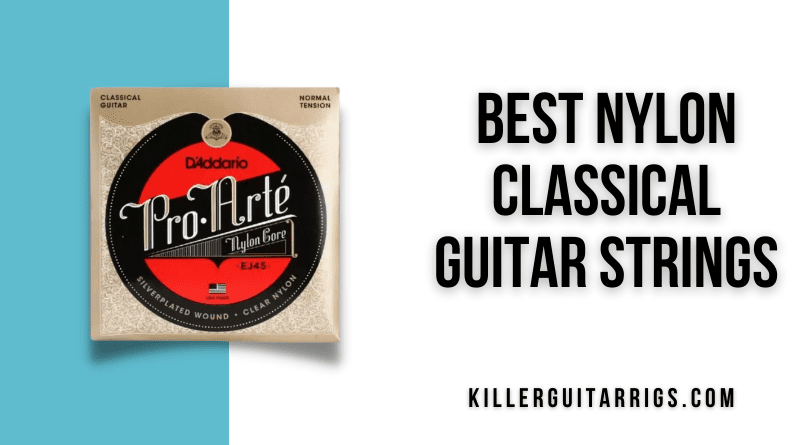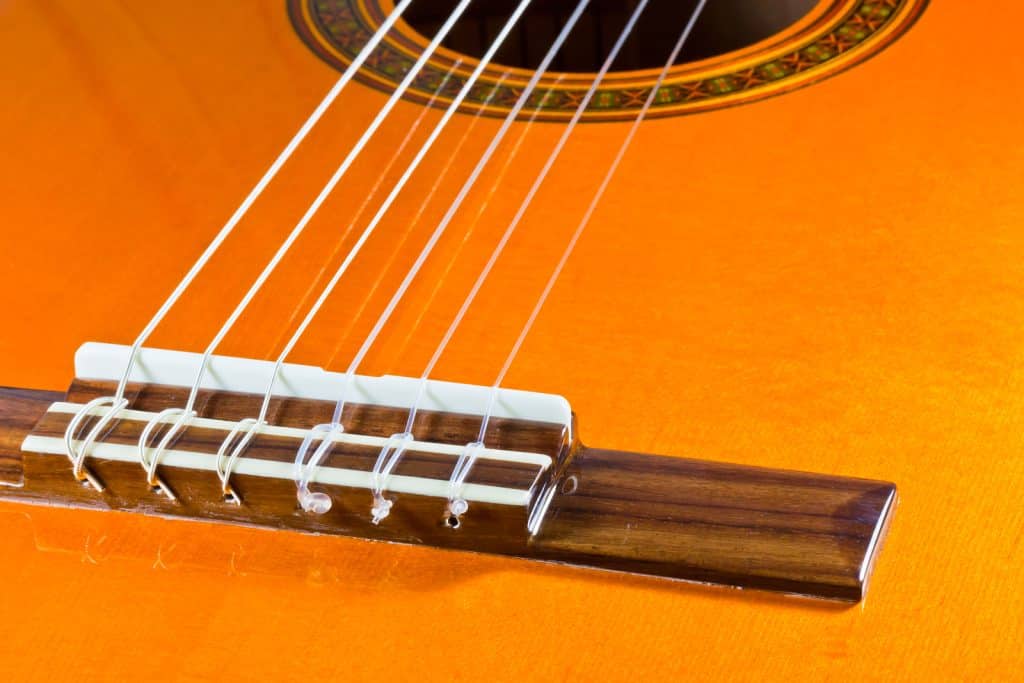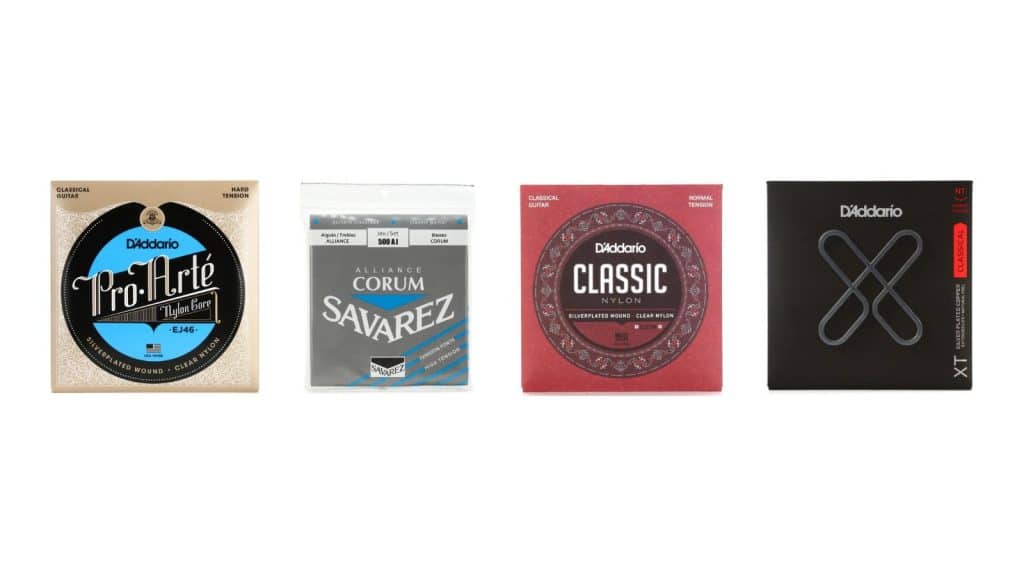You are a classical guitarist looking to enhance your playing experience with the best strings for your instrument. In this article, you will discover a range of high-quality strings specifically designed for classical guitarists. Whether you are a beginner or an experienced player, finding the right strings can make a world of difference in the tone, projection, and overall feel of your playing. So, let’s explore the top options available and help you choose the perfect strings to take your classical guitar performance to new heights.
Types of Classical Guitar Strings
When it comes to classical guitar strings, there are several options to choose from that can greatly impact the sound and playability of your instrument. Each type of string has its own unique characteristics and is designed to cater to different playing styles and preferences. In this article, we will explore the different types of classical guitar strings available, along with the factors you should consider when choosing strings for your guitar.
Nylon Strings
Nylon strings are the most common choice for classical guitarists. They are known for their warm and mellow tone, making them perfect for classical and folk music. Nylon strings are made from a solid or multifilament nylon core, wrapped with various materials such as nickel or silver. These strings offer a smooth and comfortable playing experience, making them suitable for beginners and experienced players alike.
Fluorocarbon Strings
Fluorocarbon strings are relatively new to the market but have quickly gained popularity among classical guitarists. These strings are made from a synthetic material called fluorocarbon, which offers a brighter and more articulate sound compared to nylon strings. Fluorocarbon strings also have excellent projection and sustain, making them a great choice for musicians who want their playing to be heard in larger concert halls.
Silver-plated Copper Strings
Silver-plated copper strings offer a unique combination of warmth and brilliance. These strings have a copper core, which provides rich and warm tones, while the silver plating enhances the brightness and clarity of the sound. Silver-plated copper strings are favored by performers who want a balance between the warmth of nylon and the brightness of fluorocarbon strings.
Composite Strings
Composite strings are a blend of materials, usually a combination of nylon and other synthetic materials such as carbon or Kevlar. These strings are designed to offer the best of both worlds, combining the warmth and mellow tones of nylon with the improved projection and clarity of synthetic materials. Composite strings are known for their versatility and are commonly used by professional classical guitarists.
Factors to Consider When Choosing Strings
Now that we have explored the different types of classical guitar strings, let’s delve into the factors you should consider when choosing the right strings for your instrument. These factors will help you determine which strings will meet your specific needs and preferences.
Tone
Tone is one of the most important factors to consider when choosing classical guitar strings. Each type of string produces a distinct tone, ranging from warm and mellow to bright and articulate. Consider the musical genres you will be playing and the type of sound you desire. Nylon strings are known for their warm and mellow tone, while fluorocarbon strings offer a brighter and more articulate sound.
Projection
Projection refers to how well the sound of your guitar carries in a large performance space. If you are a performing guitarist, it is essential to choose strings that have good projection. Fluorocarbon strings are known for their excellent projection and sustain, making them a popular choice among concert guitarists.
Playability
Playability is another crucial factor to consider. The feel and comfort of the strings greatly affect your ability to play the guitar and express yourself musically. Nylon strings are generally smoother and more comfortable to play, especially for beginners. However, if you prefer a faster and more responsive feel, fluorocarbon or composite strings may be a better choice.
Durability
Durability is an important consideration, especially if you are a frequent player or perform regularly. Some types of strings may last longer than others, particularly in terms of retaining their tonal qualities. Be sure to choose strings that are durable and can withstand your playing style and frequency.
Cost
Lastly, consider your budget when choosing classical guitar strings. Different types of strings come at varying price points, and it is important to find strings that offer the best value for your money. Remember, higher-priced strings may not necessarily be the best choice for your needs, so consider your budget alongside other factors.
Nylon Strings
Nylon strings have been the standard choice for classical guitarists for decades, and for good reason. They offer a warm and mellow sound that is perfect for classical and folk music. Nylon strings are typically made from a solid or multifilament nylon core, which is wrapped with various materials for added durability and tonal variation.
Characteristics
Nylon strings are known for their flexibility and elasticity. They are relatively easy to play and provide a comfortable playing experience. Nylon strings also have a slower decay and less sustain compared to other types of strings. This characteristic is preferred by classical guitarists who want to control the length and decay of each note.
Sound
The sound produced by nylon strings is warm, mellow, and well-rounded. They have a rich and full-bodied tone that is pleasing to the ear. This warm tone blends well with the natural resonance of classical guitars, creating a harmonious sound that is often associated with classical music.
Pros and Cons
Nylon strings offer several advantages that make them a popular choice among classical guitarists. They are known for their comfortable feel, making them suitable for beginners and players who prefer a more relaxed playing experience. Nylon strings also offer good value for money, as they are generally more affordable compared to other types of strings.
However, nylon strings do have some drawbacks. They have less projection and sustain compared to fluorocarbon or composite strings, which may not be ideal for players who perform in larger concert halls. Additionally, nylon strings may be more prone to wear and tear, especially if you have a heavy playing style or tend to bend the strings frequently.
Fluorocarbon Strings
Fluorocarbon strings have gained popularity among classical guitarists in recent years. These strings are made from a synthetic material called fluorocarbon, which offers a brighter and more articulate sound compared to nylon strings. Fluorocarbon strings are known for their excellent projection, sustain, and responsiveness.
Characteristics
Fluorocarbon strings are highly responsive, meaning they quickly respond to the player’s touch and produce a fast and articulate sound. They have a higher density compared to nylon strings, which results in improved projection and volume. Fluorocarbon strings also have a longer sustain, allowing notes to ring out for a longer duration.
Sound
The sound produced by fluorocarbon strings is bright, clear, and highly articulate. These strings emphasize the upper harmonics and treble frequencies, making them ideal for players who want their playing to cut through in a larger performance space. The bright and clear sound of fluorocarbon strings is particularly well-suited for genres such as flamenco and jazz.
Pros and Cons
Fluorocarbon strings offer several advantages that make them a popular choice among professional classical guitarists. Their bright and articulate sound is highly desirable for genres that require a crisp and clear tone. Fluorocarbon strings also offer excellent projection and sustain, making them suitable for larger concert halls and performance venues.
However, the brightness of fluorocarbon strings may not be to everyone’s taste. Some players may find the sound too harsh or lacking in warmth, which is a trademark of nylon strings. Additionally, fluorocarbon strings are generally more expensive compared to nylon strings, which may be a consideration for those on a budget.
Silver-plated Copper Strings
Silver-plated copper strings offer a unique combination of warmth and brilliance. These strings have a copper core, which provides rich and warm tones, while the silver plating enhances the brightness and clarity of the sound. Silver-plated copper strings are favored by performers who want a balance between the warmth of nylon and the brightness of fluorocarbon strings.
Characteristics
Silver-plated copper strings provide a balanced and versatile playing experience. The copper core offers a warm and responsive feel, while the silver plating enhances the tonal characteristics of the strings. This combination results in a well-rounded sound that is suitable for a wide range of musical genres.
Sound
The sound produced by silver-plated copper strings can be described as warm, articulate, and well-balanced. These strings offer a harmonious blend of warmth and brightness, making them suitable for players who want a versatile sound that can adapt to different musical styles. Silver-plated copper strings are often favored by classical guitarists who require a balanced tone for both solo performances and ensemble playing.
Pros and Cons
Silver-plated copper strings offer a unique tonal characteristic that appeals to many classical guitarists. They provide warmth and depth, similar to nylon strings, while also offering enhanced brightness and clarity. These strings offer excellent projection and sustain, making them suitable for both intimate settings and larger concert halls.
However, silver-plated copper strings tend to be more expensive compared to nylon strings. They may also require more frequent maintenance and cleaning to prevent tarnishing and preserve the silver plating. Despite these considerations, many players find the tonal qualities of silver-plated copper strings worth the investment.
Composite Strings
Composite strings are a relatively new development in the world of classical guitar strings. These strings are made from a combination of materials, often a blend of nylon and other synthetic materials such as carbon or Kevlar. Composite strings are designed to offer the best of both worlds, combining the warmth and mellow tones of nylon with the improved projection and clarity of synthetic materials.
Characteristics
Composite strings offer a balanced and versatile playing experience. They combine the flexibility and comfort of nylon strings with the improved projection and tonal clarity of synthetic materials. The precise combination of materials used in composite strings can vary, resulting in a wide range of tonal possibilities and playing characteristics.
Sound
The sound produced by composite strings depends on the specific materials used in their construction. However, in general, composite strings offer a balanced and well-rounded sound that blends warmth and clarity. These strings are often favored by players who want a versatile sound that can adapt to different musical styles and playing techniques.
Pros and Cons
Composite strings offer several advantages that make them an attractive choice for classical guitarists. They provide a comfortable playing experience, similar to nylon strings, while also offering improved projection and clarity. Composite strings are known for their versatility, making them suitable for a wide range of musical genres and playing styles.
However, the tonal characteristics of composite strings may not be as distinctive as those of nylon or fluorocarbon strings. Some players may find the sound of composite strings to be less unique or expressive. Additionally, composite strings are often more expensive compared to nylon strings, which may be a consideration for players on a tight budget.
String Tension
In addition to the different types of strings available, it is also important to consider the tension of the strings. String tension refers to how tightly the strings are wound, which affects the playability and tonal characteristics of the guitar. There are three main categories of string tension: high tension, normal tension, and low tension.
High Tension
High tension strings have a tighter winding and offer a higher level of resistance when played. These strings require more finger strength to press down on the frets, making them suitable for players with a robust technique and strong hands. High tension strings also produce a louder and more powerful sound, with enhanced sustain and fuller tone.
Normal Tension
Normal tension strings are the most commonly used type of classical guitar strings. They strike a balance between playability and tone. Normal tension strings offer a comfortable playing experience, making them suitable for players of all levels. They produce balanced tones with sufficient projection and sustain, making them a versatile choice for various musical genres.
Low Tension
Low tension strings have a looser winding and offer less resistance when played. These strings require less finger strength to press down on the frets, making them suitable for players with a lighter touch or those who prefer a more relaxed playing experience. Low tension strings produce a warm and mellow sound with less projection compared to higher tension strings.
String Gauges
In addition to tension, another important aspect to consider when choosing classical guitar strings is the gauge. String gauge refers to the thickness of the strings, which can affect the playability and tone of the guitar. There are three main gauge categories: light gauge, medium gauge, and heavy gauge.
Light Gauge
Light gauge strings have a thinner diameter and offer less tension when played. These strings are suitable for players who prefer a lighter touch or those who want to achieve faster and more responsive playing. Light gauge strings are generally easier to bend and provide a brighter and more articulate sound.
Medium Gauge
Medium gauge strings strike a balance between playability and tone. They are the most commonly used gauge for classical guitar strings. Medium gauge strings provide a versatile playing experience, making them suitable for various musical genres and playing styles. They produce a well-balanced tone with sufficient projection and sustain.
Heavy Gauge
Heavy gauge strings have a thicker diameter and offer more tension when played. These strings are suitable for players who prefer a heavier touch or those who want to achieve a rich and full-bodied sound. Heavy gauge strings require more finger strength to press down on the frets and can produce a louder and more powerful sound with enhanced sustain.
Popular Brands of Classical Guitar Strings
Now that we have explored the different types, tensions, and gauges of classical guitar strings, let’s take a look at some of the popular brands that offer high-quality strings for classical guitars. These brands have a reputation for producing reliable and consistent strings that cater to the needs of classical guitarists.
D’Addario
D’Addario is one of the most well-known and trusted brands in the world of guitar strings. They offer a wide range of classical guitar strings, including nylon, fluorocarbon, and composite options. D’Addario strings are known for their consistent quality and excellent tonal characteristics.
Savarez
Savarez is a French brand that has been producing strings for classical guitars since 1770. They are known for their high-quality and precision-crafted strings. Savarez offers a variety of options, including nylon, fluorocarbon, and silver-plated copper strings.
Hannabach
Hannabach is a German brand that has been producing strings for classical guitars since 1869. They are known for their exceptional craftsmanship and attention to detail. Hannabach offers a range of nylon and silver-plated copper strings that cater to the needs of classical guitarists.
La Bella
La Bella is an American brand that has been producing strings for various instruments, including classical guitars, since 1640. They are known for their handcrafted strings that are made with the finest materials. La Bella offers a range of nylon and silver-plated copper strings that provide excellent tone and playability.
Augustine
Augustine is a Spanish brand that has been producing strings for classical guitars since 1947. They are known for their traditional nylon strings that offer a warm and mellow tone. Augustine strings have been used by renowned classical guitarists around the world.
Conclusion
Choosing the right strings for your classical guitar is crucial to achieving the desired sound and playability. Consider the different types of strings available, such as nylon, fluorocarbon, silver-plated copper, and composite, and explore their unique characteristics and tonal qualities. Take into account factors like tone, projection, playability, durability, and cost when making your decision.
Experimenting with different types, tensions, and gauges of strings is essential to finding the combination that suits your playing style and musical preferences. Pay attention to the sound and feel of the strings and how they enhance your playing experience. And remember, finding the best strings for your classical guitar is a personal journey that will ultimately lead to the sound and expression you desire.











